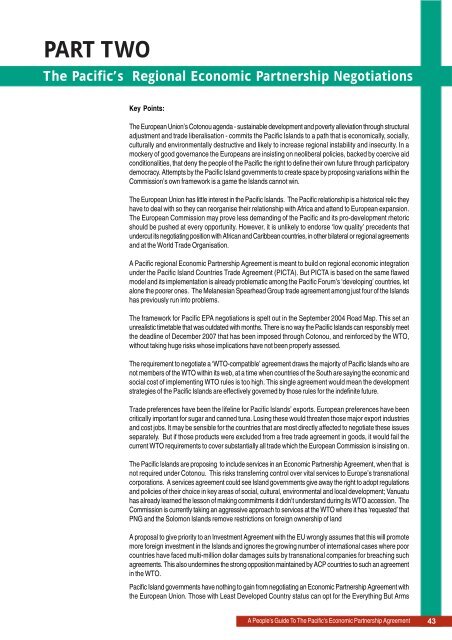REPA Booklet - Stop Epa
REPA Booklet - Stop Epa
REPA Booklet - Stop Epa
Create successful ePaper yourself
Turn your PDF publications into a flip-book with our unique Google optimized e-Paper software.
PART TWO<br />
The Pacific’s Regional Economic Partnership Negotiations<br />
Key Points:<br />
The European Union’s Cotonou agenda - sustainable development and poverty alleviation through structural<br />
adjustment and trade liberalisation - commits the Pacific Islands to a path that is economically, socially,<br />
culturally and environmentally destructive and likely to increase regional instability and insecurity. In a<br />
mockery of good governance the Europeans are insisting on neoliberal policies, backed by coercive aid<br />
conditionalities, that deny the people of the Pacific the right to define their own future through participatory<br />
democracy. Attempts by the Pacific Island governments to create space by proposing variations within the<br />
Commission’s own framework is a game the Islands cannot win.<br />
The European Union has little interest in the Pacific Islands. The Pacific relationship is a historical relic they<br />
have to deal with so they can reorganise their relationship with Africa and attend to European expansion.<br />
The European Commission may prove less demanding of the Pacific and its pro-development rhetoric<br />
should be pushed at every opportunity. However, it is unlikely to endorse ‘low quality’ precedents that<br />
undercut its negotiating position with African and Caribbean countries, in other bilateral or regional agreements<br />
and at the World Trade Organisation.<br />
A Pacific regional Economic Partnership Agreement is meant to build on regional economic integration<br />
under the Pacific Island Countries Trade Agreement (PICTA). But PICTA is based on the same flawed<br />
model and its implementation is already problematic among the Pacific Forum’s ‘developing’ countries, let<br />
alone the poorer ones. The Melanesian Spearhead Group trade agreement among just four of the Islands<br />
has previously run into problems.<br />
The framework for Pacific EPA negotiations is spelt out in the September 2004 Road Map. This set an<br />
unrealistic timetable that was outdated with months. There is no way the Pacific Islands can responsibly meet<br />
the deadline of December 2007 that has been imposed through Cotonou, and reinforced by the WTO,<br />
without taking huge risks whose implications have not been properly assessed.<br />
The requirement to negotiate a ‘WTO-compatible’ agreement draws the majority of Pacific Islands who are<br />
not members of the WTO within its web, at a time when countries of the South are saying the economic and<br />
social cost of implementing WTO rules is too high. This single agreement would mean the development<br />
strategies of the Pacific Islands are effectively governed by those rules for the indefinite future.<br />
Trade preferences have been the lifeline for Pacific Islands’ exports. European preferences have been<br />
critically important for sugar and canned tuna. Losing these would threaten those major export industries<br />
and cost jobs. It may be sensible for the countries that are most directly affected to negotiate these issues<br />
separately. But if those products were excluded from a free trade agreement in goods, it would fail the<br />
current WTO requirements to cover substantially all trade which the European Commission is insisting on.<br />
The Pacific Islands are proposing to include services in an Economic Partnership Agreement, when that is<br />
not required under Cotonou. This risks transferring control over vital services to Europe’s transnational<br />
corporations. A services agreement could see Island governments give away the right to adopt regulations<br />
and policies of their choice in key areas of social, cultural, environmental and local development; Vanuatu<br />
has already learned the lesson of making commitments it didn’t understand during its WTO accession. The<br />
Commission is currently taking an aggressive approach to services at the WTO where it has ‘requested’ that<br />
PNG and the Solomon Islands remove restrictions on foreign ownership of land<br />
A proposal to give priority to an Investment Agreement with the EU wrongly assumes that this will promote<br />
more foreign investment in the Islands and ignores the growing number of international cases where poor<br />
countries have faced multi-million dollar damages suits by transnational companies for breaching such<br />
agreements. This also undermines the strong opposition maintained by ACP countries to such an agreement<br />
in the WTO.<br />
Pacific Island governments have nothing to gain from negotiating an Economic Partnership Agreement with<br />
the European Union. Those with Least Developed Country status can opt for the Everything But Arms<br />
A People’s Guide To The Pacific’s Economic Partnership Agreement 43
















